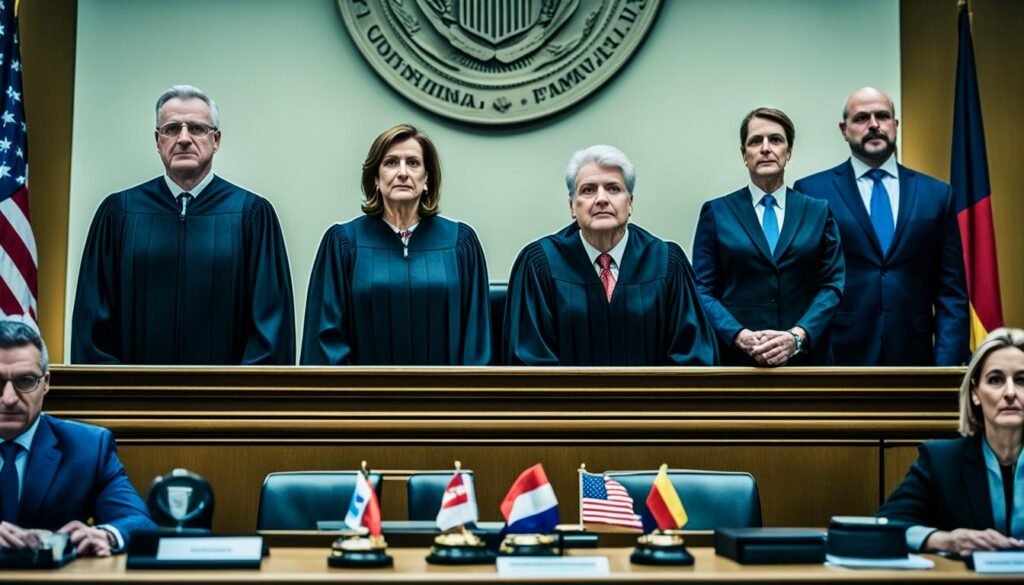Criminal law is a complex and multifaceted field of study that transcends national boundaries. It is a body of law that defines criminal offenses, prescribes punishments, and outlines the procedures for prosecuting and adjudicating criminal cases. In recent years, there has been a growing recognition of the importance of examining criminal law from an international perspective.
Also Read: What Role Does Justice Play In Justifying Law?
The book “International Perspectives on Crime and Justice,” edited by K. Jaishankar, provides a comprehensive exploration of the global dimensions of criminal law and justice. The book brings together leading criminologists from around the world to address some of the most pressing international criminal justice issues, including political corruption, state-funded terrorism, transnational crime, drug policy, domestic violence, juvenile justice, and victimization.
The book offers an interdisciplinary perspective on criminal law, examining the interplay between law, politics, culture, and social values. It highlights the diversity of criminal justice systems globally and the challenges of harmonizing principles and practices across different legal traditions and national contexts. The book is a valuable resource for scholars, policymakers, and practitioners interested in understanding the international dimensions of criminal law and justice.
Key Takeaways : Criminal Law
- Criminal law is a complex and multifaceted field that extends beyond national boundaries.
- The book “International Perspectives on Crime and Justice” provides a comprehensive exploration of the global dimensions of criminal law and justice.
- The book brings together leading criminologists to address pressing international criminal justice issues, such as political corruption, state-funded terrorism, and transnational crime.
- The book offers an interdisciplinary perspective on criminal law, examining the interplay between law, politics, culture, and social values.
- The book highlights the diversity of criminal justice systems globally and the challenges of harmonizing principles and practices across different legal traditions and national contexts.
Introduction to International Criminal Law
International criminal law is a distinct branch of public international law that defines and punishes crimes of international concern. This field has evolved significantly over the past century, shifting from a focus on state-to-state relations to the prosecution of individuals for serious violations of human rights and humanitarian law.
Also Read: How Are Contracts Enforced In Contract Law?
Defining International Criminal Law
International criminal law encompasses the rules, principles, and procedures that govern the prosecution of individuals for the most egregious crimes affecting the global community. These include crimes against humanity, war crimes, genocide, and aggression. The primary goal of international criminal law is to hold perpetrators accountable and deter future atrocities, while also upholding universal human rights standards.
Historical Evolution of International Criminal Law
The modern foundations of international criminal law can be traced back to the Nuremberg Trials following World War II, where Nazi leaders were prosecuted for their role in the Holocaust and other war crimes. This landmark development paved the way for the subsequent establishment of ad hoc international criminal tribunals, such as the International Criminal Tribunal for the former Yugoslavia (ICTY) and the International Criminal Tribunal for Rwanda (ICTR). In 2002, the International Criminal Court (ICC) was established under the Rome Statute, further cementing the framework of international criminal justice.
Sources and Principles of International Criminal Law
The sources of international criminal law are diverse, drawing from a combination of international treaties, customary international law, and general principles of law. Key principles underlying this field include universal jurisdiction, which allows states to prosecute certain crimes regardless of where they were committed, and the doctrine of complementarity, which gives the ICC jurisdiction only when national courts are unwilling or unable to investigate and prosecute these offenses.
| Key Developments in the Historical Evolution of International Criminal Law |
|---|
|
Theoretical Foundations of Criminal Law

The theoretical foundations of criminal law are rooted in various philosophical and jurisprudential traditions, including retributive justice, deterrence theory, and rehabilitation. Retributive justice holds that criminals should be punished proportionately to their crimes, based on principles of moral philosophy and legal philosophy. Deterrence theory, on the other hand, aims to prevent future crimes through the threat of punishment, drawing from social contract theory and utilitarian concepts.
Also Read: DSST Exams: Are You Prepared To Ace Them?
In contrast, the rehabilitation approach seeks to reform offenders and reintegrate them into society, emphasizing the incapacitation of dangerous individuals and the restorative justice model, which focuses on addressing the harm caused and restoring the offender’s relationship with the community.
Other influential theoretical frameworks in criminal law include legal positivism, which emphasizes the primacy of formal law, and natural law theory, which grounds criminal law in moral and ethical principles. The ongoing debates between these various philosophical and jurisprudential perspectives continue to shape the development and application of criminal law both nationally and internationally.
| Theory | Key Principles | Philosophical Foundations |
|---|---|---|
| Retributive Justice | Proportionate punishment for crimes | Moral Philosophy, Legal Philosophy |
| Deterrence Theory | Prevention of future crimes through threat of punishment | Social Contract Theory, Utilitarianism |
| Rehabilitation | Reformation and reintegration of offenders | Incapacitation, Restorative Justice |
| Legal Positivism | Primacy of formal law | Legal Philosophy |
| Natural Law Theory | Grounding of criminal law in moral and ethical principles | Moral Philosophy |
These diverse philosophical foundations and jurisprudential traditions continue to shape the development and application of criminal law theory in both national and international contexts, influencing the goals, principles, and approaches to criminal justice.
Substantive Aspects of Criminal Law

The substantive elements of criminal law define the essential components of criminal offenses and the circumstances under which individuals can be held criminally liable. This section explores the elements of crimes, the concept of criminal responsibility, and the various defenses that can be invoked to mitigate or negate liability.
Also Read: CTC Exams Prep: Your Pathway To Teaching Certification
Elements of Crimes
The core elements of a criminal offense typically include a prohibited act (actus reus) and a culpable mental state (mens rea). The actus reus refers to the physical conduct or omission that is deemed unlawful, while the mens rea encompasses the individual’s mental state, such as intent, knowledge, recklessness, or negligence, at the time of the criminal act. Establishing both the actus reus and the mens rea is essential for a successful criminal prosecution.
Criminal Responsibility and Defenses
An individual’s criminal liability is determined by their capacity to be held responsible for their actions. Defenses to criminal liability may be based on justifications, such as self-defense or necessity, or excuses, such as insanity or involuntary intoxication. These defenses can serve to either completely absolve the individual of criminal responsibility or mitigate the severity of the punishment.
Specific Crimes under International Law
The realm of international crimes includes the most serious violations of human rights and humanitarian law, such as genocide, crimes against humanity, war crimes, and aggression. These crimes are defined by various international treaties and conventions, including the Rome Statute of the International Criminal Court. Additionally, terrorism, organized crime, environmental crimes, and corporate crimes have emerged as growing concerns in the international criminal law landscape.
| Crime | Definition | Culpable Mental State | Potential Defenses |
|---|---|---|---|
| Genocide | The intentional destruction of a national, ethnic, racial, or religious group | Intent to destroy the group | Mistake of fact, duress, superior orders |
| Crimes Against Humanity | Widespread or systematic attacks against a civilian population | Knowledge of the attack and intent to further the attack | Mistake of fact, superior orders, self-defense |
| War Crimes | Serious violations of the laws and customs of war | Intent or recklessness regarding the unlawful nature of the conduct | Mistake of law, superior orders, self-defense |
| Aggression | The use of armed force by a state against the sovereignty, territorial integrity, or political independence of another state | Knowledge of the factual circumstances and intent to use armed force | Necessity, self-defense |
Procedural Aspects of International Criminal Trials

The procedural frameworks governing international criminal trials are shaped by the distinct institutional structures of various international and hybrid courts. These tribunals grapple with key issues surrounding jurisdiction and admissibility, the protection of fair trial rights and due process, and the rules of evidence and procedure that guide the collection, presentation, and evaluation of evidence.
Also Read: Cracking DCAS Exams: Are You Ready?
Jurisdiction and Admissibility
The jurisdiction of international criminal courts and tribunals is typically defined by their governing statutes, such as the Rome Statute of the International Criminal Court (ICC). Jurisdictional reach may be based on territory, nationality, or the nature of the alleged crimes. The principle of complementarity under the ICC Statute requires that cases be admissible only when national courts are unwilling or unable to prosecute. Determining the admissibility of cases is a critical procedural hurdle for these courts.
Fair Trial Rights and Due Process
Upholding the fundamental rights of the accused, including the right to a fair trial, is a core principle of international criminal procedure. This entails safeguarding protections such as the presumption of innocence, the right to counsel, the right to present a defense, and the right to appeal. Ensuring due process also requires transparency, impartiality, and adherence to international human rights standards throughout the proceedings.
Rules of Evidence and Procedure
International criminal tribunals have developed comprehensive rules governing the collection, presentation, and evaluation of evidence. These rules aim to ensure the reliability and probative value of evidence while also protecting the rights of victims and witnesses. Procedures for the disclosure of evidence, the handling of confidential information, and the participation of victims in the proceedings are key aspects of the evidentiary framework.
| Procedural Aspect | Key Considerations |
|---|---|
| Jurisdiction and Admissibility |
|
| Fair Trial Rights and Due Process |
|
| Rules of Evidence and Procedure |
|
International Criminal Tribunals and Courts

The modern system of international criminal justice is characterized by the establishment of various international and hybrid criminal courts and tribunals. These institutions have played a crucial role in developing and enforcing international criminal law, including the prosecution of individuals for the most serious crimes affecting the international community.
The International Criminal Court (ICC)
The International Criminal Court (ICC) is a permanent, independent judicial institution established by the Rome Statute in 2002. The ICC has jurisdiction over the most serious crimes of international concern, such as genocide, crimes against humanity, war crimes, and the crime of aggression. With 123 state parties, the ICC operates under the principle of complementarity, which means it can only exercise jurisdiction when national courts are unable or unwilling to investigate and prosecute these crimes.
Ad Hoc International Criminal Tribunals
Prior to the establishment of the ICC, the international community convened several ad hoc international criminal tribunals to address specific atrocities, including the International Criminal Tribunal for the former Yugoslavia (ICTY) and the International Criminal Tribunal for Rwanda (ICTR). These tribunals, established by the United Nations Security Council, played a pioneering role in the development of international criminal law and the enforcement of universal jurisdiction.
Hybrid and Internationalized Courts
In addition to the ICC and ad hoc tribunals, the international community has also established hybrid and internationalized courts to address serious crimes in specific contexts, such as the Special Court for Sierra Leone, the Extraordinary Chambers in the Courts of Cambodia, the Special Tribunal for Lebanon, and the Kosovo Specialist Chambers. These courts combine international and national elements, aiming to balance local ownership, capacity-building, and adherence to international standards.
The establishment of these diverse international and hybrid criminal courts and tribunals has been a significant development in the field of international criminal law. These institutions have contributed to the evolution of accountability mechanisms, the protection of human rights, and the pursuit of justice for the most serious crimes affecting the international community.
Criminal Law and Human Rights

The intricate relationship between criminal law and human rights is a crucial aspect of the global legal landscape. On one hand, criminal law serves as a vital mechanism for protecting fundamental human rights by prohibiting and punishing the most egregious violations, such as genocide, crimes against humanity, and war crimes. On the other hand, the exercise of criminal justice itself must adhere to and uphold established human rights standards, particularly concerning due process and fair trial guarantees.
The Interplay between Criminal Law and Human Rights
International human rights law and criminal law share a symbiotic relationship, with each field informing and influencing the other. Criminal law provides a crucial framework for enforcing human rights norms and ensuring accountability for their violation. Conversely, human rights principles, as enshrined in various international treaties and customary international law, serve to shape and constrain the application of criminal law, ensuring that individual rights are protected throughout criminal justice proceedings.
Protecting Victims’ Rights in Criminal Proceedings
The rights of victims have become an increasingly central concern in the evolution of international criminal law. Victims of serious crimes, including those falling under the jurisdiction of international criminal courts and tribunals, are entitled to a range of protections and entitlements, such as the right to participate in proceedings, the right to receive reparations, and the right to access restorative justice mechanisms. These victim-centric approaches are crucial for promoting transitional justice and ensuring that the criminal justice system adequately addresses the needs and concerns of those harmed by the most egregious international crimes.
Comparative Perspectives on Criminal Law

The world’s criminal law systems reflect a diverse array of legal traditions, regional influences, and cultural factors. The two dominant legal traditions that have shaped modern criminal justice systems are the common law and civil law traditions.
Common Law vs. Civil Law Traditions
Common law systems, such as those found in the United States, the United Kingdom, and other former British colonies, place a greater emphasis on case law developed through judicial precedent. In contrast, civil law systems, prevalent in much of Europe, Latin America, and parts of Asia, rely more heavily on comprehensive criminal codes and statutes enacted by legislative bodies. These fundamental differences in legal philosophy and sources of law have resulted in distinct approaches to criminal sentencing, punishment, and the balance between retributive and restorative justice.
Regional and Cultural Variations in Criminal Law
Beyond the common law–civil law divide, criminal law systems around the world also reflect a range of regional and cultural influences. Islamic law, for instance, has shaped criminal justice practices in many Muslim-majority countries, incorporating principles of rehabilitation and restitution alongside traditional retributive elements. Similarly, African customary law and Latin American jurisprudence have developed unique perspectives on sentencing and punishment, often emphasizing community-based approaches to justice. Across Asian legal systems, the influence of Confucian, Buddhist, and other philosophical traditions has also contributed to diverse criminal law frameworks.
Contemporary Challenges and Emerging Issues

As the world continues to evolve, international criminal law faces a number of contemporary challenges and emerging issues that reflect the rapidly changing global landscape. From the growing threat of terrorism to the rise of cyber crimes and transnational organized crime, the field of international criminal law must adapt and respond to these emerging threats.
Terrorism and International Criminal Law
The increasing prevalence of terrorism and its transnational nature has posed significant challenges for the international criminal justice system. Coordinating international cooperation and jurisdiction across borders has become crucial in combating this global scourge. Additionally, the need to balance human rights protections with effective counterterrorism measures has become a delicate balancing act for policymakers and practitioners in the field of international criminal law.
Cyber Crimes and Transnational Organized Crime
The rapid advancement of new technologies has given rise to a new frontier of criminal activity, including cyber crimes and transnational organized crime. The borderless nature of the digital world has made it increasingly difficult to investigate, prosecute, and adjudicate these types of offenses. International cooperation and the harmonization of legal frameworks are essential in addressing these emerging issues and ensuring that jurisdiction and accountability are properly established.
Environmental Crimes and Corporate Accountability
As the world grapples with the urgent challenges of climate change and environmental protection, the role of international criminal law in addressing environmental crimes and ensuring corporate accountability has become increasingly important. The complexities of regulating globalized corporate activities and the transnational nature of environmental crimes have highlighted the need for strengthened international cooperation and the development of specialized legal frameworks to address these contemporary challenges.
| Contemporary Challenge | Emerging Issue | Key Considerations |
|---|---|---|
| Terrorism | International Criminal Law | Coordinating international cooperation, balancing human rights and counterterrorism measures |
| Cyber Crimes | Transnational Organized Crime | Addressing the borderless nature of digital crimes, harmonizing legal frameworks, establishing jurisdiction and accountability |
| Environmental Crimes | Corporate Accountability | Regulating globalized corporate activities, developing specialized legal frameworks, ensuring international cooperation and environmental protection |
Also Read: What Role Does Justice Play In Justifying Law?
Conclusion
In conclusion, this article has examined the diverse and evolving landscape of international criminal law from a global perspective. The field has undergone significant development over the past century, moving from a focus on state-to-state relations to the prosecution of individuals for the most serious crimes affecting the international community.
As the world grapples with emerging challenges such as terrorism, cybercrime, transnational organized crime, and environmental degradation, the need for robust and harmonized international criminal justice mechanisms has become increasingly pressing. Cooperation and coordination among nations, international organizations, and civil society will be essential to address these complex, cross-border issues and uphold fundamental human rights and the rule of law.
Looking to the future, the continued evolution of international criminal law will likely be shaped by advancements in technology, the growing emphasis on sustainable development and climate change mitigation, and the ongoing pursuit of accountability and justice for the most egregious violations of international norms. By fostering greater cooperation, strengthening accountability mechanisms, and adapting to the changing global landscape, the international criminal justice system can play a vital role in promoting peace, security, and the protection of human dignity worldwide.
FAQs
Q: What is criminal law definition?
A: Criminal law is a branch of law that defines offenses and prescribes punishments for those who commit them.
Q: What are the types of criminal cases?
A: Criminal cases can be categorized as felonies or misdemeanors based on the seriousness of the offense.
Q: What is a felony?
A: A felony is a serious crime that is typically punishable by imprisonment for more than one year.
Q: What is a misdemeanor?
A: A misdemeanor is a less serious offense than a felony and usually carries a maximum penalty of up to one year in jail.
Q: What are the principles of criminal law?
A: The principles of criminal law include presumption of innocence, burden of proof, due process, and proportionality in sentencing.
Q: What is criminal behavior?
A: Criminal behavior refers to actions that violate criminal laws and can result in legal consequences such as prosecution and imprisonment.
Q: What is the role of a criminal defense attorney?
A: A criminal defense attorney represents individuals charged with committing crimes and defends them in court to ensure their rights are protected.
Q: What are the elements of criminal law?
A: The elements of criminal law include the actus reus (criminal act), mens rea (criminal intent), causation, concurrence, and legality of the act.
Source Links
- https://www.cambridgescholars.com/resources/pdfs/978-1-4438-0198-0-sample.pdf
- https://www.legal-tools.org/doc/29427e/pdf/
- https://www.ojp.gov/ncjrs/virtual-library/abstracts/international-criminal-justice-issues-global-perspective





